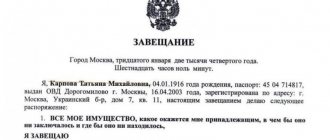What may be the grounds for increasing inherited shares?
Let's start with the term itself.
Increment of shares in an inheritance is a procedure for revising the division of the property of the deceased, accompanied by the redistribution of inherited shares of some persons in favor of others.
To implement this legal action, compelling reasons are required. Let's name them and consider them in more detail.
Unworthy heirs
These are those persons (they are called “disappointed heirs”) who, by law or will, are deprived of the opportunity to enter into inheritance rights. There are many reasons for assigning this status.
In particular, an apostate heir is a citizen who has committed an unlawful act against the testator. For example, he made an attempt on his life in order to obtain the property subsequently due to him under the will/law.
This category of persons also includes parents who were once deprived of parental rights, but who had not been restored by the time the inheritance arose.
For more information about who else is included in this group of people, read the separate material “Unworthy Heirs”.
Invalidation of a will
The reasons for this may vary. For example, if it is proven that the person was incompetent at the time of drawing up and signing the will. Or if it turns out that the document was drawn up under the influence of a third party who misled the testator.
The deadlines for accepting the inheritance were violated
A citizen is allocated a certain time during which he has the opportunity to enter into inheritance rights. If this deadline is missed without objective reasons, then the property will either be redistributed among other persons, or recognized as escheat and transferred to the balance of the state.
More information on this issue can be found in the material “Time limits for accepting an inheritance.”
Refusal of inheritance
Any person has the right to both accept the values assigned to him by law/will and to refuse them.
Refusal of inheritance also entails an increase in inheritance shares to other persons claiming these material benefits.
Absolute refusal of inheritance
Unlike directed, absolute renunciation involves the renunciation of the property of the deceased without indicating the person in whose favor this is being done. That is, the citizen simply expresses a desire not to enter into the right of inheritance, leaving the law to decide the future fate of the testator’s property.
More details about what this procedure is in the material “Refusal of inheritance”.
It is important to note one nuance. A citizen retains the right to use if he renounces his share in the inheritance.
For example, if a son renounces ownership of his father’s apartment, then after that he can still live in it, that is, use it. But in fact, the person who has entered into inheritance rights to the apartment will be able to actually dispose of the housing (sell, rent, etc.). For example, his brother, mother.
Waiver of mandatory share by law
In certain situations, the law provides for a mandatory share in the inheritance for socially vulnerable persons. For example, this could be the testator's disabled spouse.
In such cases, the law tries to protect the citizen by automatically assigning to him part of the property of the deceased.
Some notaries question the possibility of such persons refusing their allotted share. However, legal practice proves that this procedure takes place.
Moreover, in each individual case, lawyers and judges (if necessary) must weigh the pros and cons, as well as the objective abilities of the heir to soberly assess the situation.
Features of the procedure
Circumstances vary, and features arise that are taken into account when registering the increment of the received share. There is a rule stating that if the part of the inheritance to be renounced is stipulated in the testamentary document, then the applicants for shares in the increments are considered the legal heirs. And vice versa, if the expression of will involves the distribution of all hereditary objects, the shares are distributed among the subjects specified in it.
Moreover, increments are allowed only in the same percentage. An exception is the personal order of the testator, reflected in the expression of will, when he assumes such a development of events and makes the decision himself. And if the deceased bequeathed specific objects of inheritance to certain persons, this fact does not affect the loss and addition. The assignment of new shares is made on a general basis in the manner prescribed by current legislation.
Special conditions apply for mandatory shares. The purpose of compulsory inheritance is to ensure a normal lifestyle for disabled persons in need of social protection. These are minor blood children of the deceased, as well as dependents who were dependent on the testator in the last year of life. This category of citizens is not considered to have fallen away, which means that their shares are not taken into account for the increase, they are retained by them, and are subject to acceptance.
Waivers of inheritances that are obligatory shares are permissible in the presence of special circumstances. Property is divided in accordance with the entry procedure. When the obligatory legal successor no longer exists, but the disclaimer indicates a specific person accepting his shares, the increment does not come into force. Only the amount allocated to a new applicant from the list of possible ones increases.
Who can benefit from the increment?
Any of the legal successors has the right to refuse acceptance. There are necessary conditions for this:
- The person is named in the testamentary document.
- The subject is included in the priority circle of applicants.
The group of people who are apostates may include:
- those who have not submitted an application for membership within six months;
- those who executed a waiver agreement without specifying a successor;
- unworthy heirs who violated the law in relation to the owner;
- entering on the basis of forged, falsified papers.
Rights to inherit shares lost due to valid reasons are restored in court. The reason for voluntary deprivation may be a large debt of the testator to creditors who have the right to claim money from the heir.
What is the outcome of the distribution of shares?
Civil legislation regulates the principles of establishing norms for the growth of inherited property during increment. A document defining the procedure is a will, if the text indicates proportions or specific items that become the property of specific persons in the event of refusal of one of the heirs. In the absence of this condition, the shares are distributed equally among the remaining participants in the division of shares.
The right to inherit a share passes to the first-priority successors by law:
- if there is only one testamentary successor and he refused;
- the entire inheritance volume of property values is bequeathed;
- the applicant under the will is single and died during the period of the inheritance case.
The leading argument is the testator’s instructions stated in the testamentary documentation.
How does increment occur?
The increment is implemented in two stages, which must be completed within up to 6 months.
Stage 1
Exclusion of an heir for one of the above reasons. An heir who wants to write a waiver of the property of the deceased submits a corresponding application to the notary. The document is transmitted in person or in any other convenient way. Including through a trusted person.
Once a lawyer has reviewed the issue and approved the application, you can move forward.
It should be remembered that a citizen has the right to refuse bequeathed material wealth even after accepting an inheritance. The main thing is to comply with the deadline of 6 months.
If he decides to give up the property after this period, then the case will be considered in court.
Stage 2
The procedure for redistributing the property of the deceased begins, taking into account the fallen heirs. At the same time, the norms established by law are observed.
After all recalculation of shares, the heirs submit an application for acceptance of the property and prepare a package of documents that is required by the notary in a particular case. Based on the results, they are issued a certificate of right to inheritance.
At this stage, any interested party has the right to challenge the redistribution of shares in court. In this case, the process of issuing certificates of inheritance rights is suspended until the court makes a final decision on the case.
How to draft an increment waiver?
In the course of an inheritance case, it is permissible to formalize a waiver of part of the inherited volume. To do this, contact the notary office that opened the inheritance. The text lists items whose acceptance is undesirable. As a rule, these are objects that are followed by debt obligations. When there are special conditions that do not allow one to get rid of duties, they turn to the court at the location of the notary.
The right to inheritance can be rejected partially or completely. The statement of claim requires payment of a state fee. Supporting documentation is attached to the complaint, since such a strong-willed decision must be justified and the reasons for not accepting the share must be significant and objective. For example, this is the inability to pay off creditors, the lack of physical ability to maintain inherited assets in proper condition, sufficient material security, etc.
This also activates the share increment mechanism. The property renounced by the heir passes to the claimants under the will, and in the absence of one or theirs, to the relatives of the deceased person. Everything that was written about earlier works. An additional entry period is assigned in order to divide the values in proportion to the shares due according to the will of the testators or by law.
Types of waiver of share
Absolute voluntary deprivation or rejection of a part (due inheritance share) of material benefits is allowed. A similar function is available if the person accepting the share takes ownership based on the following prerequisites:
- increment;
- transmission;
- will;
- in law.
Determining the relinquished share is a voluntary decision. A notary's participation will be required. No reservations or special conditions are permitted. The leading right is the testator's right to dispose of personal property at his own discretion.
Cases when refusal of a share is legal under the law
Article 1161 of the Civil Code provides for situations that allow one to refuse the incremented share. According to the principles of inheritance, this is possible when:
- The testator foresaw the death of the successor and made appropriate orders.
- Rights to inherited property arise as a result of transmission.
- The rejected applicant indicated to whom to transfer the valuables after the refusal was formalized.
- The death of the heir occurred after six months had passed (he is automatically considered to have entered).
- The summoned citizen died before or at the same time as the owner of the property.
The list includes cases when inherited shares are transferred to the general inheritance mass and the principles of increments serve as the result of distribution.
Increment rules
The principle of recalculation of shares depends on whether the testator bequeathed all the assets or only part of them:
- If a citizen has made a will for all the material goods he has, then in the event that some heirs are recognized as unworthy, the property is distributed among other heirs under the will in accordance with the size of their shares in the inheritance. First, the obligatory share of the inheritance for socially vulnerable heirs (if any) is deducted from the bequeathed property, and the subsequent increase in the inheritance shares is carried out without them, and without heirs by law.
- If only part of the property was described in the will or the will was not drawn up at all, then the share of the fallen heirs is distributed among the heirs according to the law, taking into account their allotted shares. If there are heirs under the will, then the redistribution of shares does not apply to them, since they receive only that part of the property that was specified in the will.
Rules and main stages of increment
The increment of shares in an inheritance is recognized as a complex matter, opened by a notary at the place where the inheritance case was opened. The procedure consists of two stages, between which you need to wait six months.
- The subject of the inheritance case refuses his own share (in the absence of a voluntary refusal, a court decision is issued). This person has the right to send a statement of intent, by mail or by representative. Having received this paper, the notary checks its legality and verifies the signature (when transferring a document by a representative, he is required to provide notarization in the first person). The refusal must be formalized 6 months after the opening of the inheritance case: the owner has the opportunity to accept the property and then refuse it.
- Refusal is possible after the expiration of the period established by law, but it requires mandatory judicial review.
- Then there is an increase in the share that has moved away from one of the subjects. A person claiming to increase part of the inheritance writes an application, collects documents and receives a certificate of inheritance. Each of the heirs, by law, must agree to such actions; if this cannot be achieved, they have to go to court for the division of property.
Important! Having renounced his rights, the successor cannot change his mind, so such a process requires careful consideration of the decision made.
It is important to correctly fill out documents expressing a desire to increase the share of inherited property, indicating what exactly is required. It is preferable to entrust this process to a notary who has the necessary education and abilities to competently complete the increment procedure. The occurrence of any errors requires a complete correction of the document.
Important! Heirs can draw up an application not only independently, but also through notarized representatives.
Hereditary mass
When the process of distributing the deceased's property occurs, it is important to know what exactly is included in the estate. This term refers to a set of rights and obligations transferred to citizens from the testator by will or law.
For more information about what is and is not included in the inheritance, read the separate article “Inherited mass”.
Judicial practice under Article 1161 of the Civil Code of the Russian Federation
Determination of the Judicial Collegium for Civil Cases of the Supreme Court of the Russian Federation dated June 13, 2017 N 19-КГ17-8
In case of exclusion from inheritance on the grounds established by Article 1117 of the Civil Code of the Russian Federation, the part of the inheritance that would have been due to the fallen heir passes to the heirs by law, called to inherit, in proportion to their inherited shares (clause 1 of Article 1161 of the Civil Code of the Russian Federation).
Determination of the Judicial Collegium for Civil Cases of the Supreme Court of the Russian Federation dated November 21, 2017 N 18-КГ17-202
In case of exclusion from inheritance on the grounds established by Article 1117 of the Civil Code of the Russian Federation, the part of the inheritance that would have been due to the fallen heir passes to the heirs by law called to inherit, in proportion to their inheritance shares (clause 1 of Article 1161 of the Civil Code of the Russian Federation).
Cases in which the increment does not occur
The topic will not be discussed without considering cases where the increment does not occur:
- Only one heir is included in the will or the will is declared invalid. If the only citizen indicated in the will refused the inheritance, turned out to be unworthy, or if the will was annulled, then the property of the deceased passes to his heirs by law in accordance with the shares due to them. Increment in this case is impossible, since initially there was no division of property between several parties.
- If the will includes not only direct heirs, but also designated heirs. The latter enter into rights to property when the direct heirs: die before the opening of the inheritance or after, but without accepting it;
- die at the same time as the testator;
- do not accept the inheritance or refuse it;
- have no rights to inheritance or are considered unworthy.
If even the appointed persons refuse the property and there are no other heirs, then the inheritance will be recognized as escheated and transferred to the balance of the state.
True, there is an exception here. So, if the designated heir disappears for some reason, and more heirs are indicated in the will, then his share is added to the shares of other persons laying claim to the property of the deceased:
- in case of transfer of rights to receive inheritance through hereditary transmission;
- when the heir indicates in whose favor he renounces the inheritance;
- the heir died before or at the same time as the testator (inheritance by law).
In what cases is this not possible?
There are a number of cases when the increase does not occur, the redistribution of property is not carried out, even if the successor refuses his part of the inheritance.
We recommend reading: Confirmation of kinship for inheritance
All cases are enshrined in Art. 1161 of the Civil Code of the Russian Federation:
- When the testator bequeathed all the property with the assignment of designated successors.
- The share is transferred according to the right of transmission established by law.
- The recipient of the inheritance, in his refusal, indicated the person claiming the property.
- The heir dies along with the testator.
- There is no official document certified by a notary containing the will of the abandoned heir.
This increment procedure is possible under the following conditions:
- the presence of a minimum number of inheritors (two), according to the law, a will, or meeting both conditions;
- refusal of one of the successors to give up his part;
- acceptance of property by the remaining subjects of inheritance.
After opening an inheritance case, the notary finds out the presence of “disappeared” legal successors. Failure to comply with the first condition reveals the need to search for other legal entities. The absence of the second condition entails the impossibility of increment. Failure to comply with the last condition causes requirements for the designation of a new circle of inheritors (their absence after the expiration of the limitation period , as well as its transfer to the state).
Increment procedure
This is a rather complex process, so it includes two stages, between which a six-month interval is established.
The first stage is the heir’s refusal to receive his share or his recognition as unworthy. In case of voluntary refusal, it must be notarized. To do this, the renounced heir must either submit the application in person or send it by letter or with an authorized representative. The authorized person must have a power of attorney with appropriate powers. The renunciation of inheritance must be completed within six months from the date of death of the testator. A situation is acceptable when an inheritance is accepted and then abandoned.
If the six-month deadline is missed, there must be good reasons for this. In this case, the issue of inheritance will be considered in court.
The second stage is the transfer of the share of the refused to the remaining heirs. After the heir refuses his share, the remaining applicants must submit an application and documents confirming their right to receive it. After this, they will be issued an additional certificate to receive a share in the inheritance. But this is possible only if all heirs agree with the division of the vacated share. If at least one of them is against it, the case is sent to court.
It is important to take into account that voluntary renunciation of a share in the inheritance is irreversible. Therefore, you need to weigh this decision taking into account such consequences.
An application for an additional share in the inheritance must be submitted to a notary on a special form. He will help you compose it without errors.
Compensation for the disproportion between the received property and the inherited share
Article 1170 of the Civil Code of the Russian Federation contains explanations regarding the procedure and features of compensation that the heir receives due to the discrepancy between the property actually received and the share due to him. In a significant part of the cases, we are talking about large property (house, apartment, land), which cannot be physically divided, or this division is considered inappropriate.
There are two possibilities for resolving the issue of compensation :
- A mutual agreement between heirs as a result of which compensation occurs at the expense of one of them by transferring personal property to the other. In this case, he can receive a larger share than stated in the will (for example, receive the entire house for his use, reimbursing other heirs for the cost of their shares).
- Going to court.









